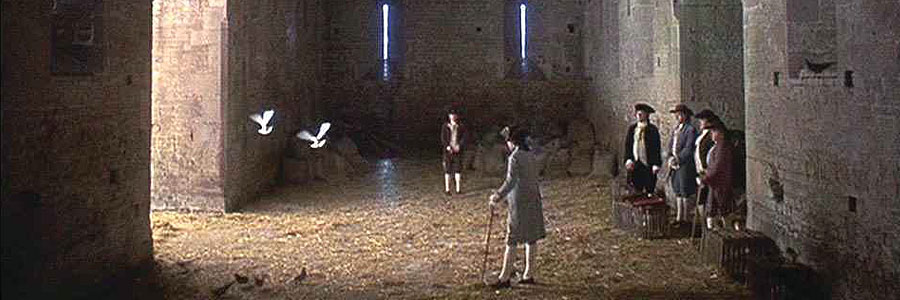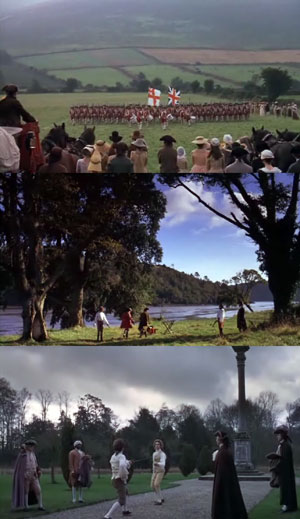
Barry Lyndon
Warner Bros.
Original release: December 18th, 1975
Running time: 184 minutes
Director: Stanley Kubrick
Writers: Stanley Kubrick, William Makepeace Thackeray
Cast: Ryan O’Neal, Marisa Berenson, Leon Vitali, Patrick Magee, Leonard Rossiter
Final duel scene 02:35:27 to 02:43:56
Deconstructing Cinema: One Scene At A Time, the complete series so far

It was in the reign of King George III that the aforesaid personages lived and quarrelled; good or bad, handsome or ugly, rich or poor, they are all equal now.
One of the reasons why Stanley Kubrick is my favorite director of all time, apart from his stunning visual aesthetic, of course, was his willingness to dive into and explore a variety of genres and themes in the dozen or so films he created during his career.
For example, the sci-fi spectacle 2001: A Space Odyssey dabbled in the metaphysical themes of man vs. machine and humanity; the Vietnam war film Full Metal Jacket in the contrasting “duality of man”; the historical epic Spartacus in the very ideals of the meaning of freedom; and the edgy black comedy A Clockwork Orange with its controversial social commentary on violence and suppression of such, to name but just a few of his masterpieces. In contrast, the period piece Barry Lyndon doesn’t have particular themes at all.
Barry Lyndon is certainly one of his most curious and challenging films to slog through. It’s not as much a film as a cold, manipulative exercise in experimental filmmaking, with Kubrick presenting his quite epic and moving story — about a young Irishman’s misadventures in the late 1770s — under a thick and lavish glaze of inscrutable elegance that makes us feel like we’re watching something akin to a Jacques Louis David painting come to life (and very little else added extra).
All that classically gorgeous visual beauty ultimately serves as nothing more important than to accentuate the deliberate lack of emotional involvement on the director’s part, a practice that Kubrick incorporates into all of his work (perhaps the most obvious being 2001: A Space Odyssey) — but that detachment has never been more apparent here. Barry Lyndon, subsequently, is a magnificent achievement, and one, that for better or for worse, is forced to stand alone as a unique, unparalleled, and oftentimes misunderstood film.

Every scene is approached with a kind of languid yet perfectly paced and rigorously kept rhythm, even when we’re dealing with deadly pistol duels — there are three of them total shown in Barry Lyndon.
This scene in question comes near the long, very winding end of the film where Barry Lyndon (Ryan O’Neal) has been challenged to a duel by his son-in-law, the impetuous and infuriated young Lord Bullingdon (Leon Vitali), seeking “satisfaction” for a previous public humiliation and the purported mistreatment of his mother, the Countess of Lyndon (Marisa Berenson). It should be noted that Barry Lyndon, through various acts of cruelty and general wrong-doing throughout his mini-odyssey to rise to the top of nobility, is no longer regarded in the eyes of the audience as a particularly likable protagonist. Kubrick, again, maddeningly does nothing to sway or influence our opinion, merely showing his creations and letting us decide. And so, naturally, we feel sympathy for Lord Bullingdon and pray that the outcome be favorable for him.
The two other pistol duels which we witnessed – one observed from a distance at the very opening of Barry Lyndon, and the other between a younger Barry and Capt. John Quin (Leonard Rossiter), which was instrumental to setting Barry off on his journey — were not only considerably shorter and faster but also different in style. This pistol scene, perhaps because of its importance, is shaped like a twisted 18th-century-style version of Russian roulette, with each duellist having their turn to fire at their opponent. A mere coin toss, regulated by duel officials who also will serve as seconds and witnesses, decides who will shoot first; an obviously terrified Lord Bullingdon correctly picks heads and goes to take his ground in the abandoned chapel where the duel will take place. Barry, reining in his emotions stolidly, makes his stand exactly ten paces away from his opponent.
Barry angles himself sideways to minimize the target. He croaks out a yes.
Perhaps due to sweaty and shaking hands, plain inexperience, or the faulty pistol – who really knows? – When Lord Bullingdon reaches down to cock his pistol, he fires it into the ground at his feet; probably the worse thing that could happen in this situation and in this moment. The young man protests to his second and the others, but in vain; the strict rules of honor is such that the accidental discharge counts as his  first shot. He may have another pistol afterwards — that is, after Barry’s had his turn at firing. That makes the young Lord Bullingdon stop staring in frozen disbelief at this rather problematic turn of events and instead start feverishly vomiting up his breakfast, something that make the witnesses visibly uncomfortable but apparently does nothing to a still emotionless Barry. When Lord Bullingdon musters his strength and staggers back to his marked spot, it seems that his end is finally near.
first shot. He may have another pistol afterwards — that is, after Barry’s had his turn at firing. That makes the young Lord Bullingdon stop staring in frozen disbelief at this rather problematic turn of events and instead start feverishly vomiting up his breakfast, something that make the witnesses visibly uncomfortable but apparently does nothing to a still emotionless Barry. When Lord Bullingdon musters his strength and staggers back to his marked spot, it seems that his end is finally near.
BANG!!! Barry has indeed fired but he’s deloped, throwing away his first fire by discharging his pistol at the ground. Well, well, Barry Lyndon. This is awfully surprising because this man, whom we’ve watched swindle his way to the top of the nobility and who hasn’t been allowed a redeeming moment at all by Kubrick, isn’t particularly known for large acts of kindness like the one, even if it’s his son-in-law. Is it possible that this is Barry’s all-important moment of redemption that we’ve been all waiting for? Whatever the theory is, this pretty much is his only forgiving and human moment in Barry Lyndon, and it’s curious that it should come at this moment and time when his own dear life hangs in the balance.
The onlookers, all of them shocked by these turn of events, turn to Lord Bullingdon and ask him, in view of Barry’s magnanimous act, does he consider having received “satisfaction”?
The young man, recovering from his initial surprise, is no longer quivering with fear, but with furious anger and disgust at the man who humiliated him and hated him from the start and now doesn’t even shoot him. He shakes his head slowly. It takes a long time for the words to come out, but when they do, they are resolutely firm and ring out clear and strong…
Do we cheer in relief and gladness for the young Lord Bullingdon, or do we quietly wince with disappointment and despair for our protagonist? What do we feel upon hearing those fateful words, and seeing Barry’s rigid and unmoving (but was that a swift expression of confused anger?) face, and watching as Lord Bullingdon (carefully, this time) cocks his pistol, raises it and shoots Barry? Do we actually feel anything at all?
That’s why this scene, in all of its five or ten brilliant minutes, is a perfect capsule representation of Barry Lyndon in general if you have to have one. It’s technically perfect; so much that I dare you to find something visually or thematically “off” with the scene. The abandoned chapel where the pistol duel takes place, with pigeons — or are they? — fluttering around the straw-littered ground, is simply gorgeous. Uniquely accentuated with natural bluish light streaming in from the narrow windows of the building, this scene is one of Oscar-winning cinematographer John Alcott’s very best accomplishments in the entire film.
- Thackeray, W. M. Barry Lyndon, Oxford Paperbacks; New Ed (2008)
The way Kubrick filmed this dramatic scene is no different then the way he did the rest of Barry Lyndon, always controlled and stately, even punishingly so. He dehumanized it and made it an almost fascinatingly mechanical, lifeless dance of death between Barry and Lord Bullingdon, much in part to the excruciatingly endless and silly formalities (a mere coin toss decides who gets to shoot first) spoken and acted out before that purportedly makes this duel a lot more refined than it actually is.
And yet, it’s still one of the most heart-pounding, nail-biting and thrillingly exciting scenes in Barry Lyndon. Like the film itself, it’s a masterful, expansive experiment in style and substance that doesn’t appear to be one.

Max Lalanne
Max Lalanne is an award-winning student filmmaker - whose debut short won a prestigious award at the Houston Intl. Film Festival when he was just 13. The bi-lingual film blogger and critic also has his own movie website, SmellofPopcorn.com.
He loves almost all kinds of cinema and watches a diverse array of movies on a regular basis, some of his favourites include Dr. Strangelove, Fight Club, Lord of the Rings, Aliens, and Finding Nemo. You can follow Max on Twitter @maxlalanne.
© 2022 STATIC MASS EMPORIUM . All Rights Reserved. Powered by METATEMPUS | creative.timeless.personal. | DISCLAIMER, TERMS & CONDITIONS
HOME | ABOUT | CONTACT | TWITTER | GOOGLE+ | FACEBOOK | TUMBLR | YOUTUBE | RSS FEED
CINEMA REVIEWS | BLU-RAY & DVD | THE EMPORIUM | DOCUMENTARIES | WORLD CINEMA | CULT MOVIES | INDIAN CINEMA | EARLY CINEMA
MOVIE CLASSICS | DECONSTRUCTING CINEMA | SOUNDTRACKS | INTERVIEWS | THE DIRECTOR’S CHAIR | JAPANESE CINEMA





